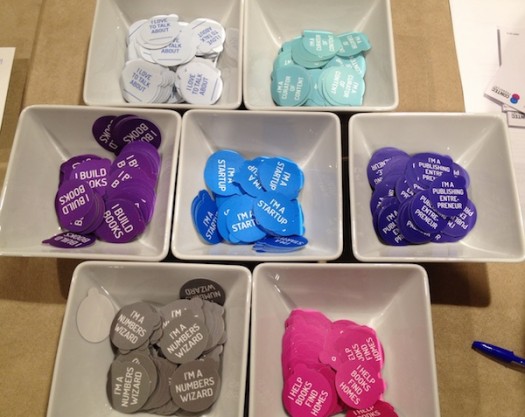
VQR’s Jane Friedman is at Frankfurt Book Fair this week, participating in a future-of-publishing experiment called Sprint Beyond the Book. Stay tuned for more dispatches from the event.
———
Today I attended Frankfurt Book Fair’s CONTEC conference. The name CONTEC represents the marriage between “content” and “technology,” and featured more than sixty speakers from twenty countries. At the end of a very full day of keynotes and interactive sessions, an editor from Publishers Weekly shared his main takeaway in the conference ballroom: “The self-publishing discussion is the only conversation we need to be having today.”
This was after a program that included every major publishing buzzword and talking point, including metadata, start-ups, supply chains, responsive content, libraries, bookselling, print business models, and more. (See the full program here.)
But based on the sessions I attended, I have to say he was right: All the changes happening in publishing were in fact encapsulated in a single two-hour panel conversation on self-publishing, with nine people from a wide cross-section of the publishing community. That’s not to say the other sessions were irrelevant or lacking in quality, but that this panel felt like its beating heart. (Or—perhaps for some—an uncontrollable tumor that threatens the entire organism.)
The panel, moderated by journalist Porter Anderson, kicked off with a discussion of no fewer than three studies that attempt to uncover the motivations and attitudes of self-publishing authors. (And these were in addition to an earlier author study in 2013 by Digital Book World, also publicized at industry events.) One wonders: After decades of experience working with countless authors, do publishers really not understand their needs? Are they so out of touch? Or is this spate of research more reflective of ongoing bafflement, a need to confirm the facts and figures and quantitatively discuss: Exactly what is going on here? and How can we avoid being seen as the tumor?
Some of the more interesting findings were discussed by Dr. Florian Geuppert, CEO of Books on Demand, a platform for self-publishing in Europe:
- Self-published authors are increasingly conscious in their choice for self-pub. Sixty percent see no difference between them and authors with traditional publishers. One-third made an active choice against traditional publishing.
- Self-publishing authors fall into three groups: (1) hobby authors, the majority; (2) professional writers; and (3) experts using self-pub as a way of sharing expertise. The authors’ top reasons for self-publishing: creative freedom and control, followed by ease of process and time to market.
- Seventy-five percent see marketing as the big advantage of traditional publishing.
In another study, shared by attendee Sam Missingham of The Bookseller (UK’s trade publication on publishing), 53 percent of traditional authors have contemplated switching to self-publishing, and their main complaints are lack of marketing and poor communication from their publisher. According to that same study, self-publishing authors who consider switching to traditional publishing are driven by bricks-and-mortar bookstore distribution and—wait for it—marketing support.
For anyone with passing familiarity of the publishing industry, this probably doesn’t come as a surprise. Book marketing and promotion has long been a skill that most authors lack, and it’s a rare author who would say, “Yes, my publisher did absolutely everything possible to support my book.” During the panel, agent Kristin Nelson told the story of a traditionally published client who did get a phenomenal level of support and enjoyed bestseller status on an international level:
That sort of focused program and marketing campaign happens to maybe ten authors or fifteen in a given year. When a traditional publisher does it, it’s magical. It’s unbelievable what they can do. But it’s not going to happen for every book.
Amazon’s Jon Fine (also a member of the VQR advisory board) chimed in, “It’s a crapshoot,” explaining that you can’t depend on being the author who gets that level of treatment or commitment.
However, the challenge of self-published authors especially is that there’s no one formula that consistently works. Michael Tamblyn of Kobo (an e-book device and retailer) said of book marketing, “It’s a ground game, it becomes a vocation. It’s an accumulation of individual promotion effort and audience gathering over time.” And furthermore, he added, it’s always mutating. What works one day doesn’t work the next. To which agent Jonny Geller of Curtis Brown responded, “It is unsustainable for a writer to do that….That’s why [traditional] publishing works, in a weird way.”
The entire panel seemed to agree that traditional publishing isn’t going away—and no one wished for that outcome—but there is a desire and need for partnership. Amazon’s Fine went so far as to say that the traditional and self-publishing models are converging, with publishers becoming more author-centric, such as offering sales portals, and following practices set by Amazon, Kobo, and other publishing services for authors. “In ten years, I don’t know if we’ll talk about self-publishing,” he said. (Perhaps this is a conclusion easily drawn only by Amazon, which has blurred the line between book retailer, publisher, and author service provider.)
Until the day of convergence comes (if it comes), it was clear from the panel that self-publishing—and digital publishing specifically—is providing a needed and profitable path for mid-list authors, who may be dropped by their traditional houses if they haven’t broken out by their third or fourth book. Self-publishing bestseller Hugh Howey pointed out that he didn’t break out until his eighth book, and argued, “We [as an industry] don’t appreciate yet the long tail of self-publishing. Your books are available forever. They have the same visibility forever….It’s a marathon. Things go viral over time.”
While self-published books are popularly characterized as lower quality than traditionally published books, readership and sales are growing to such a level that online retailers are starting to publicize their success. Tamblyn said that 10 percent of Kobo’s unit sales are coming from self-published authors, and Fine said that, in the last year, 25 percent of Amazon’s Top 100 books were self-published. This later segued to Howey’s point that there’s a lot of money to be made in books that “no one ever reads.” Because e-books “disappear” (you don’t have that to-be-read pile staring at you from your nightstand), and because e-books are priced lower (often 99 cents to $2.99 for a self-published novel), there’s a reduced consequence to buying and not reading, both psychologically and economically.
Low prices are a common strategy self-publishers use (that traditional publishers have been slower to adopt) to increase their chances of being discovered by readers. And finding that readership directly—through the self-publishing platforms offered by Amazon, Kobo, and many others—was a running theme through the panel discussion. Authors and publishers alike can now reach audiences that were never really looked at or marketed to before. Authors are empowered to figure out better ways to market and promote their books. As Howey said, “Everything is more focused on the reader experience,” from delivering the story readers want, at the best price possible, to authors having a relationship with readers directly.
And this is one of the key reasons why this panel serves as a touchstone for many of the challenges that now face publishing. Everyone working in the industry is thinking more about how to directly reach their specific reader community in an era of declining bricks-and-mortar stores and an increasingly digital environment driven by search, data, analytics, and social media. The ability to get information on reader or consumer behavior, and then strategically act on it, is something Steve Smith, CEO of Wiley, and CONTEC’s morning keynote speaker, emphasized again and again. He said the transformation of Wiley as a publisher has been about “going deeper into the communities we serve. It’s no longer enough to be a provider of information. We need to build our relationship with the…community through deep knowledge.”
If you want to read more related to CONTEC:
- Download the Global eBook Report that was mentioned at the conference.
- Check out this white paper on author-publisher relations, which speaks fairly directly to the threat traditional publishers face if they get cut out of the process by authors, agents, or others.







